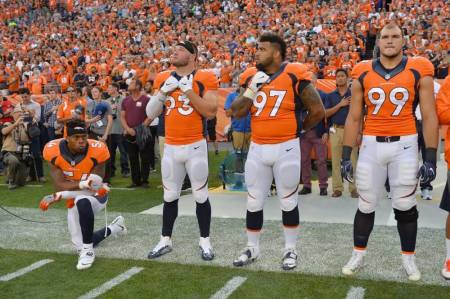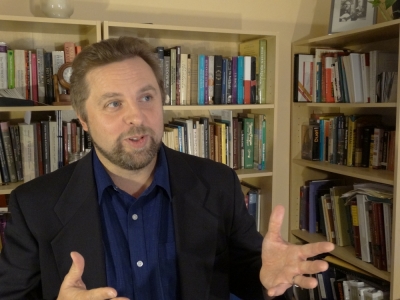Colin Kaepernick, Sports and Nationalism: Civic or Ethnic Identity?

Recently, across the nation, Sunday was a day of ritual. No, I'm not talking about church liturgies; I'm referencing rather to the demonstrations staged by a number of National Football League players during the national anthem.
Sparked by San Francisco 49ers quarterback Colin Kaepernick in protest against the supposed police brutality towards blacks, players have been sitting or kneeling rather than standing during the anthem, with high school and college teams following suit.

Reaction has been predictably polarized.
Bill O'Reilly stated that he was tired of seeing America "besmirched" by protests such as Kaepernick's, and Rep. Steve King likened such a lack of patriotism to sympathy for ISIS.
On the other side of the aisle, Michael Powell of The New York Times wrote approvingly: "Colin Kaepernick Finds His Voice," while Jordan Sargent of Deadspin summed up his sympathies with the headlines: "Colin Kaepernick Won."
However, what all of these reactions overlook is the profound window that professional sports can open into contemporary American culture, particularly in relation to nationalist complexities and loyalties.
The modern intimacy between sports and nation can hardly be overstated. In his influential study on modern sports, Allen Guttmann sees this intimacy forged at least in part through the processes of secularization. While Christians took an active role in the sports world in the late nineteenth and early twentieth centuries, sports nevertheless took on what Guttmann calls "a kind of secular faith." This was due in no small part to the modernization of sports, which involved the standardization of rules, quantification of statistics, and the professionalization of players.
Along with these processes, sports in post-Civil War society became increasingly centralized and nationalized as part of efforts to create a unitive identity. Baseball's National League was formed in 1876 and the American League a few years later. Baseball games were regularly played on the 4th of July, followed by football on Thanksgiving. And the National Anthem became the staple inaugural invocation for sporting events shortly after World War II. Today modern sport and national identity are in many respects inseparable.
And yet, scholars have observed that secularization has, however inadvertently, awakened ethnic and tribal loyalties that had long been subsumed under the more dominant nation-state project. The pluralization of values in secular society has served as the occasion for an increasingly radical multiculturalism that in effect splits nationalist fidelities. There is a widely recognized distinction between ethnic and civic nationalism. The former involves loyalties to kin, race, and ethnicity, while the latter involves allegiance to the larger nation-state project. By sanctifying the nation-state on the one hand while fostering multiculturalism on the other, secularization makes it rather difficult to forge and maintain any kind of coherent society.
I believe it is precisely this incoherence that has been on display with the Kaepernick inspired protests. According to the sports sociologist Alan Bairner, while sports are often bound up with nationalist sentiments, they also have the capacity to help undermine civic nationalism by expressing "sub-nation-state national identities and providing a vehicle for the expression of alternative visions of the nation."
As was most notably displayed by the iconic Black Power salute by Tommie Smith and John Carlos during the national anthem at the 1968 Olympic Games, sportive rituals provide players the opportunity to express their political and micro-national allegiances, made all the more conspicuous within the context of civic rituals.
But in the case of Kaepernick, such displays evidence a deeper divide that appears innate to secular society. The inherent incompatibility between civic rationalism and cultural values is, as it turns out, an irreparable fracture that ever increasingly widens. The concerns expressed by Black Lives Matter supporters as well as the Blue Lives Matter response simply serves to exasperate the split, rendering their respective ethnic and civic loyalties all the more irreconcilable. In this case, one sits, the other stands. In short, secularized multiculturalism is an incoherent culture.
Governance over multiple ethnic identities has always been a challenge. The modern nation state has attempted to meet that challenge with a rationalized public square free from kinship and familial ties and leaving values under the domain of their respective subcultures. In so doing, the nation state risks drowning in the pool of pluralized values that its own secularization has engendered. Were that to happen, then it would not be far off to say that Colin Kaepernick has indeed won.





















